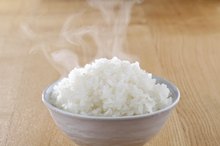Is Rice Fattening?
Rice is rich in carbohydrates, one of the three calorie-delivering nutrients that provide fuel for your body. Any food, including rice, can be fattening when portion sizes aren't controlled and you don't keep tabs on the number of calories you consume. However, eating white rice, a refined grain that's easy to digest because of its lack of dietary fiber, might derail your weight loss plan.
Rice
Rice is primarily a carbohydrate food that also gives you some protein. Rice can either fall into the whole-grain category — foods that contain the entire grain kernel, such as brown rice — or be classified as a refined grain. White rice, for example, goes through a milling process that strips it of its fiber, iron and some vitamins. Although food manufacturers enrich white rice and other processed grains with vitamins and minerals, dietary fiber cannot be added back into the food. Choosing brown rice over white helps you obtain your recommended daily fiber.
Calories
Brown Rice and Oatmeal Diet to Lose Weight
Learn More
Fad diets may encourage the consumption of specific types of foods and avoidance of others, such as carbohydrates. However, if you're concerned about losing weight or simply maintaining your existing weight, counting calories is key. One cup of cooked, converted white rice has 170 calories, while the same amount of cooked brown rice has 190 calories. When manufacturers add flavoring and other ingredients to rice, this increases the dish's calories. A cup of familiar, brand-name chicken-flavored or broccoli-and cheese-flavored rice gives you 200 calories or more. Simply adding 1 teaspoon of butter to rice adds 35 calories to your diet.
Other Information
The fiber in whole grains, such as brown rice, is tougher for your digestive tract to break down. Eating brown rice and other whole grains may prevent you from overeating. A cup of cooked rice has 2 grams of dietary fiber, giving you 8 percent of your daily value, based on a 2,000-calorie diet. Cooked white rice, on the other hand, contains no dietary fiber. Eating processed grains like white rice may even cause you to gain weight. Results of a study published in the June 2011 issue of "The New England Journal of Medicine" suggest that the types of food you eat do matter. Researchers followed 120,877 healthy adults who were not overweight over a series of several years to determine how diet affected weight gain. They determined that intake of refined grains was a contributing factor to weight gain. Other foods linked to weight gain included potato chips and potatoes, sugary drinks, sweets, fruit juice, processed meats, unprocessed red meat, fried food and butter.
Weight
Can Diabetics Eat Rye Bread & Pumpernickel Bread?
Learn More
The fiber in brown rice and other whole grain foods may not just benefit your weight loss plan. Dietary fiber helps prevent constipation and may reduce your risk for chronic conditions such as diabetes and heart disease. However, any food — even healthy whole grains — can be fattening when consumed to excess. Every pound of body fat is the equivalent of 3,500 calories you ate but your body couldn't burn. So when you choose rice as your side dish, keep calories in mind and portions under control. One serving of rice is considered 1/2 cup, roughly the size of half a baseball.
Related Articles
References
- Mayo Clinic; Counting Calories; Get Back to Weight-loss Basics; December 2009
- Harvard School of Public Health: Carbohydrates -- What Should You Eat?
- "The New England Journal of Medicine"; Changes in Diet and Lifestyle and Long-Term Weight Gain in Women and Men; D. Mozaffarian, et al.; June 2011
- Mayo Clinic; Whole Grains: Hearty Options For a Healthy Diet; June 2011
Writer Bio
Lisa Sefcik has been writing professionally since 1987. Her subject matter includes pet care, travel, consumer reviews, classical music and entertainment. She's worked as a policy analyst, news reporter and freelance writer/columnist for Cox Publications and numerous national print publications. Sefcik holds a paralegal certification as well as degrees in journalism and piano performance from the University of Texas at Austin.









